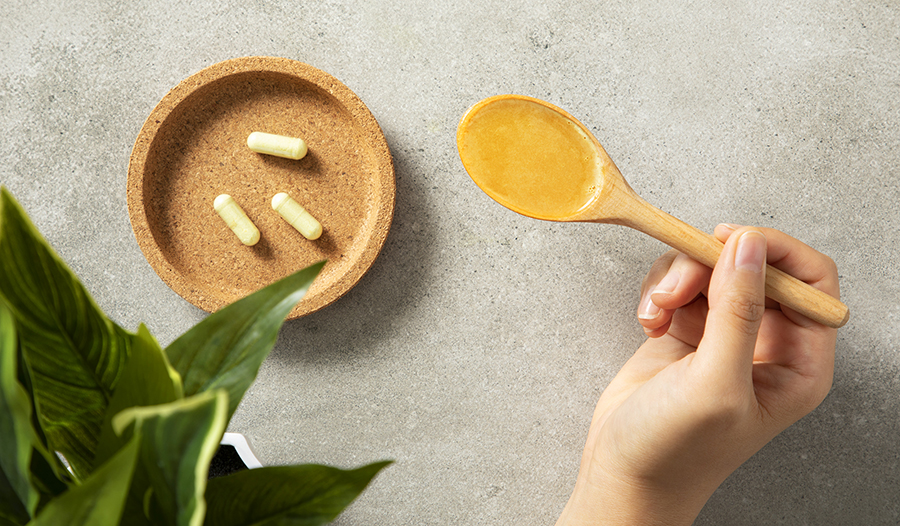Liposomal Supplements: A Breakthrough in Nutrient Delivery

Nutritional supplements can help fill gaps in an otherwise healthy diet, ensuring that you obtain sufficient amounts of essential vitamins, minerals, and antioxidants. The National Health and Nutrition Examination Survey and further research state those who take supplements have a better chance of obtaining the recommended daily intake of micronutrients.1
However, differences in production, absorption, and delivery of certain nutrients can significantly impact how much of your supplement will work the way it is intended and how much may be flushed out due to poor utilization.
Liposomal supplements are a breakthrough nutrient delivery system providing active molecules directly where they are needed most and can be optimally used. Some nutrients, such as vitamin C, vitamin D, magnesium, and glutathione, among others, are excellent candidates for liposomal delivery, which works by bypassing bodily systems such as stomach acid breakdown that decreases effectiveness.2
Although liposomal technology is newer to nutritional supplement production, the technology has been thoroughly researched and used for decades, with a fundamental understanding of the biology behind liposomes being known for hundreds of years.
Since the 1970s, pharmaceutical researchers have been investigating liposomal drug delivery. In the 1990s, drug production using liposomal technology began. Fast forward to the present, and the same revolutionary process has been applied to nutritional supplements, providing a breakthrough in bioavailability and effectiveness.
What Are Liposomal Supplements?
Liposomes are derived from lipids, the building blocks of living cells, and include triglycerides, fatty acids, and cholesterol. Lipids do not dissolve in water and, as such, support the cell membrane structure.
Vesicles are structures either inside or outside of a cell that helps with the transport of materials. Vesicles act like cellular containers filled with fluid or gas that perform various bodily roles. They can transport molecules, excrete substances, and more. Liposomes are fat-soluble vesicles with a double-ring of fatty acids.
Liposomes are produced in a laboratory setting and act like your body’s own delivery process (which uses phosphatidylcholine) but are faster in speeding up nutrient absorption. Phosphatidylcholine is comprised of a phospholipid attached to choline and is naturally occurring and easily recognizable by the body.
Since the body recognizes liposomes, it does not mount an immune response and instead accepts them into the cells where they can be put to use. The purpose of creating liposomal supplements is to use them as superior nutrient and drug delivery systems, transporting active molecules to their needed destination.1
Certain nutrients are not readily absorbed through supplements. For instance, vitamin C cannot be stored in the body. It is not sufficiently bioavailable in typical oral supplements, meaning it isn’t very well absorbed or put to use in the body. Liposomal supplement forms of nutrients like vitamin C act as a workaround to transport and deliver them where they are needed, directly to the tissues, and enhance bioavailability.3
The Advantages of Liposomal Supplements
Liposomes mimic natural cell membranes, making them easily recognizable and accepted into the body. As such, one of the most prominent benefits is their ability to facilitate direct absorption in the mouth and impede stomach acid from breaking them down and decreasing effectiveness.4
Within the gastrointestinal tract, acids present a hostile environment, breaking down nutrients in non-liposomal supplements before they can be adequately absorbed. The liposome encapsulation protects nutrients so they can be transported more effectively. What’s more, this process can also reduce potential digestive upset.
Liposomal supplements can be integrated with fat-soluble and water-soluble nutrients, so they are versatile and can be used for several types of nutrients that otherwise are not readily bioavailable in supplement form, especially for those with digestive issues.
Due to the increase in absorption, more of the nutrient is available and used in the body at lower doses compared to other oral supplementation. This means less waste and more accurate dosing.2
Accurate dosing and superior absorbability provide another substantial benefit—reduced risks of drug interactions that can lead to significant health concerns.
Since the liposome is similar to a natural cell’s lipid bilayer membrane, the nutrients inside seamlessly pass through into the tissues where they are most needed. For certain nutrients, this is a breakthrough, as they are known to be poorly absorbed through other forms of oral supplementation.
Glutathione
One such nutrient is glutathione, which is vital for regulating oxidative stress. It’s also critical for energy production, cognition, immune system function, and liver health. Studies support the use of liposomal glutathione for effectively increasing stores of the nutrient.5
NMN
Nicotinamide mononucleotide (NMN) is an anti-aging molecule that activates nicotinamide adenine dinucleotide (NAD), a coenzyme that exists in all living cells. It boosts energy production and cellular repair. By midlife, levels of NAD decrease by about half, affecting aspects such as insulin sensitivity and mitochondrial function.6
NMN has been shown to synthesize into NAD, which shows promise for several factors related to preventing age-related health issues.7 NMN is not readily bioavailable, however, and liposomal delivery is wise for optimal effectiveness.8
Curcumin
Curcumin is an anti-inflammatory polyphenol derived from turmeric with neuro and cardioprotective effects.9 It is not readily absorbed in its traditional form,10 due to poor bioavailability and fast metabolism.11 The effectiveness of curcumin supplements has vastly improved bioavailability through liposomal technology.12 Curcumin is ideal for liposomal delivery because it is a lipophilic molecule that easily permeates the cell membrane.11
Vitamin C
Vitamin C is not made by the body and must be obtained through food or supplementation. It is used to form collagen and is a potent antioxidant regulator. Oral supplementation through traditional means can often cause gastrointestinal distress and poor absorption. Liposomal delivery improves absorption and eliminates gastrointestinal side effects.3
Zinc
Zinc is a trace mineral that must be obtained through food or supplements as the body does not produce it. It boosts immune function, regulating the inflammatory response. It’s vital for healing, including skin healing making it an ideal mineral to focus on for skin health and appearance. Zinc also has antioxidant properties, buffering against the damages caused by oxidative stress. Even slight zinc deficiencies can impact your immune system functioning.13
Zinc is also critical for healthy hormonal function, including testosterone, insulin, growth hormone, and thyroid hormones.14 However, too much zinc is detrimental to health and can interfere with copper and iron absorption and function.15 For this reason, being sure to choose an accurately dosed and effective liposomal zinc supplement is ideal.
Dry Powders vs. Liquid Liposomal Supplements
Liposomal supplements come in dry powders and liquids, each with its advantages. Dry powders are best when high dosages are desirable as they are lower in volume and typically tasteless, mixing easily in water or juice, or can be encapsulated for ease of use.
The liposomal supplement is more stable and has a longer shelf life in dry form. Dry powders offer a controlled release of nutrients and can be made without preservatives or flavoring. Some nutrients, such as glutathione, are unstable in liquid form, making dry powder the superior choice.
Liquid liposomal supplements are convenient, coming already in a form that can be swallowed without mixing. Liquids can be easier to manage if you require smaller doses than minuscule amounts of powder. Liquid supplements are an excellent alternative if you have difficulty or an aversion to swallowing pills or capsules.
Factors to Consider in Liposome Production
A few factors to consider when choosing a liposomal supplement regarding how it is manufactured:
The size of the liposome is a significant factor in how effective it will be. According to research, smaller liposomes may provide exceptionally more efficient delivery of nutrients into the cells.4 In fact, cellular uptake may show a 9-fold increase when liposome size decreases from 236 nm to 97nm.16
Liposome structures that are too large will not be accepted readily into the cell, if at all. Production methods that use nanotechnology will ensure proper absorption and effectiveness. Look for liposomal supplements that have been manufactured with nanotechnology to create sizes less than 150nm.
Potency is another factor to consider. Liposomal supplements are not regulated in terms of labeling, so looking for a supplement that provides optimal potency and an effective concentration of nutrients is essential. Check labels for third-party testing to ensure quality standards.
A product with a cGMP certification (Current Good Manufacturing Practice) is proof that it is up to FDA standards enforced for proper design, monitoring, and control of all processes involved in producing the supplement. This process ensures that the product you choose has been regulated for identity, strength, quality, and purity.17
References:
- Wallace TC, McBurney M, Fulgoni VL. Multivitamin/mineral supplement contribution to micronutrient intakes in the united states, 2007–2010. Journal of the American College of Nutrition. 2014;33(2):94-102.
- Akbarzadeh A, Rezaei-Sadabady R, Davaran S, et al. Liposome: classification, preparation, and applications. Nanoscale Res Lett. 2013;8(1):102.
- Davis JL, Paris HL, Beals JW, et al. Liposomal-encapsulated ascorbic acid: influence on vitamin c bioavailability and capacity to protect against ischemia–reperfusion injury. Nutr Metab Insights. 2016;9:NMI.S39764.
- Shade CW. Liposomes as advanced delivery systems for nutraceuticals. Integr Med (Encinitas). 2016;15(1):33-36.
- Sinha R, Sinha I, Calcagnotto A, et al. Oral supplementation with liposomal glutathione elevates body stores of glutathione and markers of immune function. Eur J Clin Nutr. 2018;72(1):105-111.
- Shade C. The science behind nmn–a stable, reliable nad+activator and anti-aging molecule. Integr Med (Encinitas). 2020;19(1):12-14.
- Mills KF, et al. Long-term administration of nicotinamide mononucleotide mitigates age-associated physiological decline in mice. Cell Metab. 2016. December.
- Khan I. Anti-aging liposomal formulation: a mini review. NAPDD. 2018;3(3).
- Sharifi-Rad J, Rayess YE, Rizk AA, et al. Turmeric and its major compound curcumin on health: bioactive effects and safety profiles for food, pharmaceutical, biotechnological and medicinal applications. Front Pharmacol. 2020;11:01021.
- Anand P, Kunnumakkara AB, Newman RA, Aggarwal BB. Bioavailability of curcumin: problems and promises. Mol Pharm. 2007;4(6):807-818.
- Feng T, Wei Y, Lee RJ, Zhao L. Liposomal curcumin and its application in cancer. Int J Nanomedicine. 2017;12:6027-6044.
- Prasad S, Tyagi AK, Aggarwal BB. Recent developments in delivery, bioavailability, absorption and metabolism of curcumin: the golden pigment from golden spice. Cancer Res Treat. 2014;46(1):2-18.
- Ibs KH, Rink L. Zinc-altered immune function. The Journal of Nutrition. 2003;133(5):1452S-1456S.
- Miletta MC, Schöni MH, Kernland K, Mullis PE, Petkovic V. The role of zinc dynamics in growth hormone secretion. Horm Res Paediatr. 2013;80(6):381-389.
- Office of dietary supplements - zinc. U.S. National Institutes of Health.
- Klibanov AL, Maruyama K, Beckerleg AM, Torchilin VP, Huang L. Activity of amphipathic poly(ethylene glycol) 5000 to prolong the circulation time of liposomes depends on the liposome size and is unfavorable for immunoliposome binding to target. Biochim Biophys Acta – Biomembranes. 1991;1062(2):142–148.
- Research C for DE and. Facts about the current good manufacturing practices(Cgmps). FDA. Published online June 1, 2021.
DISCLAIMER:This Wellness Hub does not intend to provide diagnosis...
















































































 Table of Contents
Table of Contents















